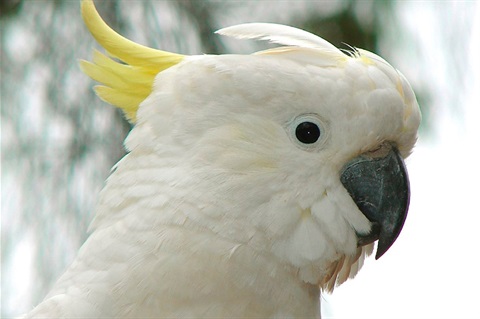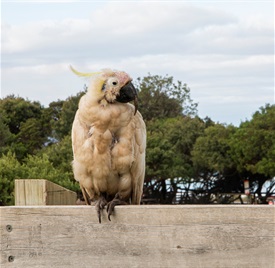Cockatoos

Wild Sulphur-crested Cockatoos have become a nuisance, particularly in some coastal towns.
They are causing severe damage to homes and property, and are also opening kerbside bins to forage for food, and spreading litter onto our streets.
Keep Wildlife Wild
It’s never a good idea to feed cockatoos non-native food, such as bread, hot chips or even wild birdseed mix.
What can happen if I feed them?
Cockatoos need to forage for their natural diet of berries, seeds, nuts and roots as part of their daily behavioural activities.
Hand feeding cockatoos or leaving out wild birdseed mix is strongly discouraged because:
- It creates a dependence on people for food

- Expecting to be fed by people, cockatoos are becoming aggressive and pestering people for food
- Setting up a feeding station for birds can spread diseases like Beak and Feather Disease (the picture on the right), which is fatal and untreatable
- Feeding attracts pests such as mice and rats into your garden
Cockatoos have plenty of natural food in the surrounding bushland. You don’t need to feed them.
Did you know?
- Wild Sulphur-crested cockatoos can live up to 50 years of age
- Their beak continually grows, so they need to chew items, including artificial structures, to maintain their beaks at the correct length and condition.
- Whenever cockatoos land, either feeding or beak maintenance occurs.
- Cockatoos are sociable and flock and roost together. Flocks form through a process called “local enhancement”, where birds in the air see birds feeding below (sometimes in our kerbside bins) and join them.
- Cockatoos use regular flight paths and return to good feeding areas repeatedly. They can be attracted to an area when someone feeds them.
Wildlife Act 1975
All Victorian wildlife, including cockatoos is protected under the Wildlife Act 1975, and it is illegal to harass or harm wildlife without permission.
The Department of Energy, Environment and Climate Action (DEECA) is the authority responsible for the management of cockatoos.
For more information and advice on managing cockatoos at your property, call DEECA on 136 186.